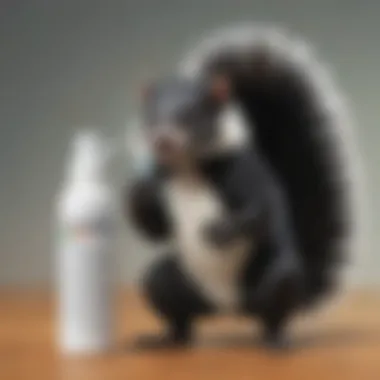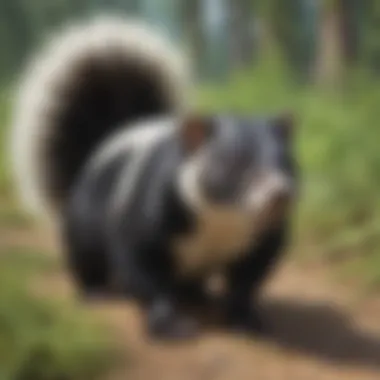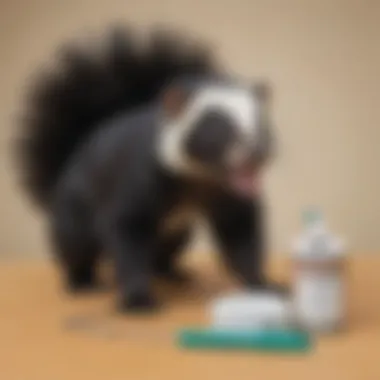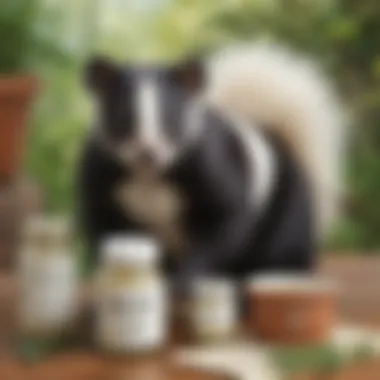Ultimate Guide to Eliminating Skunk Odor: Proven Methods


Science Fun Facts
Skunks have a unique defense mechanism of spraying a foul-smelling liquid when feeling threatened. This spray contains thiol compounds, which are responsible for the strong and persistent odor. Interestingly, skunks can accurately target their spray up to 10 feet away!
Discover the Wonders of Science
In exploring the science behind neutralizing skunk odor, it's essential to understand the chemical reactions involved. When a skunk sprays its odorous liquid, it releases volatile sulfur compounds that bind to receptors in our noses, creating the foul smell sensation. Through interactive learning tools, one can delve deeper into how these compounds interact with receptors and the environment.
Science Experiment Showcase
Conducting a simple experiment to neutralize skunk odor can be both educational and entertaining. With step-by-step instructions and a detailed materials list, anyone can create a safe and controlled environment to test various deodorizing agents. Safety tips and precautions are crucial to ensure a successful and risk-free experiment, providing valuable insights into the science behind odor elimination.
Understanding Skunk Odor
Skunk odor can be quite potent and challenging to deal with. In this in-depth guide on neutralizing skunk odor, understanding the chemical composition of skunk spray is crucial to effectively tackle this issue. By delving into the key components of skunk spray, such as Thiols, Thioacetates, and Sulfides, we can equip ourselves with the knowledge needed to combat and eliminate this unpleasant smell.
Chemical Composition of Skunk Spray
Thiols
Thiols are a significant component of skunk spray, responsible for its intense, lingering odor. These organic compounds contain sulfur and are found in various biological systems. In the context of skunk odor, Thiols contribute to the foul smell that can permeate into surfaces and fabrics, making it challenging to remove. While Thiols are effective in deterring predators, their pungent scent poses a nuisance to humans and pets alike.
Thioacetates
Thioacetates are another vital element within skunk spray, adding to the overall potency of the odor. These compounds play a role in prolonging the scent's persistence, making it difficult to mask or eliminate. Thioacetates bind to surfaces, creating a lasting and stubborn smell that requires specific treatments to break down and neutralize effectively. Understanding the presence of Thioacetates in skunk spray is essential in implementing targeted removal strategies.
Sulfides
Sulfides are key contributors to the noxious smell of skunk spray, amplifying its repellent properties. These compounds, combined with Thiols and Thioacetates, create a potent mixture that clings to surfaces and fabrics. Sulfides are volatile and can trigger olfactory receptors strongly, intensifying the offensive nature of skunk odor. Addressing the presence of Sulfides is critical in achieving thorough deodorization and restoring a fresh environment.
Why Skunk Odor Lingers


Porous Materials
One reason skunk odor lingers is its affinity for porous materials. Skunk spray can seep into fabrics, furniture, and other porous surfaces, making it challenging to remove completely. The porous nature of these materials allows the odor-causing compounds to penetrate deeply, necessitating specialized cleaning methods for effective deodorization.
Volatile Compounds
Volatile compounds in skunk spray contribute to the persistent nature of the odor. These compounds evaporate quickly, releasing the foul smell into the air and making it pervasive. Volatile compounds present in skunk spray require thorough ventilation and targeted treatment to disperse and neutralize their lingering effects.
Olfactory Fatigue
Olfactory fatigue plays a role in why skunk odor may seem to dissipate over time. This phenomenon occurs when the olfactory receptors become desensitized to a particular scent after prolonged exposure. While individuals may perceive a reduction in the skunk odor's intensity, it is essential to address the root cause of the smell to prevent reemergence and ensure complete odor removal.
Immediate Actions to Take
When dealing with the noxious aftermath of a skunk encounter, swift and decisive actions become paramount. Immediate intervention can make a significant difference in mitigating the spread and impact of skunk odor. Understanding the urgency of the situation is crucial to effectively tackling the olfactory assault that skunk spray brings. By promptly addressing the issue, you can prevent the odor from permeating further and alleviate potential discomfort and inconvenience.
Rapid Response
Avoid Water
In the realm of combating skunk odor, the choice to avoid water emerges as a strategic move. Water can exacerbate the dispersion of skunk molecules, intensifying the smell and making it harder to eradicate. The hydrophobic nature of skunk spray causes it to resist water, leading to undesirable consequences if water is used. By refraining from water, you can contain the odor and avoid spreading it to different surfaces, thereby containing the situation effectively. This precautionary step sets the stage for subsequent odor elimination methods.
Time Constraints
Time acts as a crucial factor when addressing skunk odor, emphasizing the need for prompt action. The longer the duration between exposure to skunk spray and initiation of deodorizing measures, the tougher it becomes to eradicate the pungent smell. Time constraints underscore the importance of acting swiftly and efficiently, ensuring that the odor is targeted and neutralized before it embeds itself in the surroundings. Immediate attention to de-skunking procedures is vital for successful odor removal, highlighting the significance of time sensitivity in this battle against persistent scent.
Avoiding Common Mistakes
Don't Panic
Amidst the distress of being confronted with skunk odor, it is imperative not to succumb to panic. Panicking can lead to hasty decisions that may exacerbate the situation, making odor removal more challenging. Maintaining composure allows for rational thinking and the adoption of effective de-skunking strategies. By remaining calm, you can approach the issue methodically, making informed choices that facilitate odor elimination without causing unnecessary escalation.
Don't Rub Eyes


A common mistake in the aftermath of a skunk encounter is rubbing the eyes, potentially introducing skunk remnants to sensitive mucous membranes. Rubbing the eyes can result in irritation or even exacerbate the discomfort caused by skunk spray. Avoiding this action is vital to prevent further spread of the odor and safeguard eye health. By refraining from rubbing the eyes, individuals can minimize the risk of additional complications and focus on implementing appropriate deodorizing methods to address the primary concern.
Home Remedies for Skunk Odor Removal
In the realm of skunk odor elimination, home remedies play a pivotal role in restoring freshness and comfort. These DIY solutions are not only cost-effective but also environmentally friendly, making them a preferred choice for combatting skunk odor. Home remedies offer a sense of control and empowerment to individuals dealing with this challenging situation. With natural ingredients easily found in most households, home remedies facilitate prompt and efficient odor eradication, ensuring a pleasant living environment.
Hydrogen Peroxide Solution
Ingredients Needed
When delving into the realm of skunk odor removal, the Hydrogen Peroxide Solution stands out as a remarkable ingredient due to its potent oxidizing properties. This solution typically comprises hydrogen peroxide, baking soda, and liquid dish soap. Hydrogen peroxide serves as the primary agent in breaking down the skunk spray's odorous compounds, while baking soda acts as a neutralizer, and dish soap aids in cleansing. The combination of these ingredients creates a powerful formula that effectively tackles skunk odor, ensuring swift and satisfactory results.
Step-by-Step Application
The application of the Hydrogen Peroxide Solution involves a systematic approach to maximize its odor-eliminating efficacy. Begin by mixing the hydrogen peroxide, baking soda, and dish soap in the designated proportions, ensuring a thorough blend. Apply the solution generously to the affected area, allowing it to sit for a specified duration to neutralize the skunk odor completely. Rinse off the solution thoroughly with water, pat dry, and repeat the process if necessary. The step-by-step application of the Hydrogen Peroxide Solution guarantees a comprehensive and efficient skunk odor removal process.
Baking Soda and Vinegar Mixture
Preparation Instructions
In the realm of home remedies for skunk odor removal, the Baking Soda and Vinegar Mixture emerges as a go-to solution for its exceptional odor-absorbing capabilities. The preparation involves creating a paste using baking soda and vinegar, forming a powerful yet gentle formula for combating skunk odor. Baking soda's absorbent properties coupled with vinegar's cleansing abilities make this mixture a versatile and reliable choice for odor elimination. Its simplicity in preparation and effectiveness in neutralizing odors make it a valuable asset in the quest for a fresh and clean environment.
Application Process
The application process of the Baking Soda and Vinegar Mixture entails spreading the prepared paste generously over the affected area, ensuring complete coverage. Allow the mixture to sit for a recommended period to effectively absorb and neutralize the skunk odor. Following this, rinse off the area with water and dry thoroughly. The application process of this powerful mixture guarantees a successful outcome, leaving behind a refreshing scent and a skunk-free environment.
Professional Solutions
When it comes to dealing with the potent and persistent stench of skunk odor, seeking professional solutions becomes paramount. These specialized interventions offer a level of expertise and efficacy that can be challenging to achieve with DIY approaches. Professional solutions encompass a range of techniques and products specifically designed to tackle skunk odor contamination. Abiding by professional recommendations can significantly streamline the deodorizing process and ensure a thorough elimination of the unpleasant smell.
Veterinary Recommendations
Consulting a Vet:


Consulting a veterinarian holds immense significance in the context of neutralizing skunk odor effectively. Vets possess in-depth knowledge about animal care and are well-versed in handling skunk-related incidents. Their guidance not only ensures the safety and well-being of pets but also offers tailored solutions to address specific odorous concerns. Consulting a vet allows for a comprehensive assessment of the situation, leading to targeted interventions that deliver optimal results. While consulting a vet may incur additional costs, the benefits of professional advice and specialized care outweigh the expenses in restoring a skunk-free environment.
Specialized Products:
Specialized products play a crucial role in the arsenal of professional solutions for combating skunk odor. These products are formulated with potent ingredients capable of neutralizing even the most stubborn odors effectively. Their composition targets the compounds present in skunk spray, breaking them down and eradicating the pervasive smell. Specialized products often come with detailed instructions on application, ensuring maximum effectiveness with minimal effort. While these products may come at a premium cost, their superior performance and quick results make them a preferred choice in handling skunk odor challenges.
Seeking Professional Services
Professional Cleaners:
Engaging professional cleaners for skunk odor removal presents a hassle-free and efficient solution. These experts possess the knowledge, equipment, and experience to tackle skunk-related odors effectively. Professional cleaners follow established protocols to decontaminate affected areas thoroughly, minimizing the risk of lingering smells. Their expertise in odor removal techniques ensures swift and comprehensive elimination of skunk scent, restoring fresh ambiance to living spaces. While the cost of professional cleaning services may vary, the convenience and quality results they offer make them a worthwhile investment in overcoming skunk odor issues.
Pet Grooming Services:
Pet grooming services play a vital role in addressing skunk odor incidents involving animals. Skunk spray can adhere to pet fur, leading to persistent odors that are challenging to eradicate. Professional pet groomers are equipped with specialized shampoos, techniques, and tools to remove skunk odor effectively and safely. Grooming experts understand the sensitivity of pets' skin and coat, ensuring gentle yet thorough deodorizing procedures. By entrusting pet grooming services with skunk odor removal, pet owners can ensure their furry companions are clean, comfortable, and free from malodorous reminders of skunk encounters.
Preventive Measures
When it comes to dealing with skunk odor, preventive measures play a crucial role in avoiding potential encounters with these malodorous creatures. By implementing strategic tactics in your environment, you can significantly reduce the risk of getting sprayed by a skunk. These preventive measures not only protect you and your pets from the discomfort of skunk odor but also contribute to maintaining a clean and pleasant living space. Some key elements to consider in preventive measures include understanding skunk behavior, identifying skunk-attracting factors in your surroundings, and taking proactive steps to minimize skunk interactions. By incorporating these preventive strategies, you can create a skunk-resistant environment that promotes a peaceful coexistence with wildlife.
Skunk Deterrent Tactics
Landscaping Adjustments
Landscaping adjustments serve as an effective method to deter skunks from entering your property and spraying their unpleasant odor. By carefully planning the layout of your outdoor space, you can discourage skunks from taking up residence near your home. Strategic placement of thorny plants, such as rose bushes or holly shrubs, can create natural barriers that deter skunks from venturing close. Additionally, removing potential hiding spots, such as dense vegetation or debris, can make your yard less attractive to skunks. While landscaping adjustments require effort and planning, the long-term benefits of minimizing skunk encounters outweigh the initial investment.
Physical Barriers
Introducing physical barriers around your property is another effective way to prevent skunks from entering your space. Fencing your yard with sturdy materials like wire mesh or metal fences can create a protective boundary that deters skunks. It is essential to ensure that the barrier extends below the ground to prevent skunks from burrowing underneath. Properly securing outdoor structures, such as sheds or porches, also helps prevent skunks from seeking shelter in these areas. While physical barriers require maintenance and periodic checks for damages, they offer a reliable and lasting solution to keep skunks at bay.
Pet Safety Guidelines
Supervision Strategies
When it comes to pet safety in areas with potential skunk encounters, supervision is key to preventing unwanted interactions. Establishing clear boundaries for pets and supervising their outdoor activities can help reduce the risk of encounters with skunks. Maintaining a close watch on your pets during walks or outdoor playtime allows for immediate intervention if a skunk is spotted nearby. By integrating supervision strategies into your pet care routine, you can minimize the chances of your furry companions getting sprayed by skunks and experiencing the lingering odor. While supervision requires time and attention, the peace of mind knowing your pets are safe from skunks is invaluable.
Training Recommendations
Training your pets to avoid skunks and react appropriately in their presence is essential for their safety. Teaching dogs to respond to commands that prevent them from approaching skunks can help mitigate the risk of encounters. Providing positive reinforcement for desired behaviors, such as avoiding skunk-sprayed areas or moving away from skunks, reinforces good habits in pets. Incorporating skunk-avoidance training into your pet's obedience routine strengthens their ability to coexist peacefully with wildlife. Although training recommendations require consistency and dedication, the long-term benefits of having skunk-savvy pets outweigh the initial investment in time and effort.







